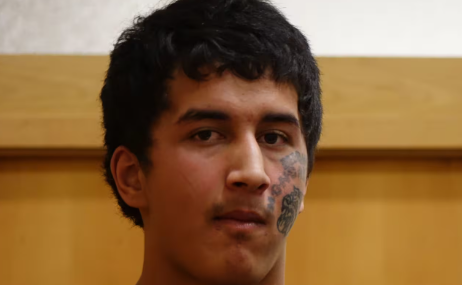
A teen Mongrel Mob affiliate who killed a Black Power affiliate with a gunshot to the face claims young people, including those with low IQs in gang situations, do not behave as adults do, particularly in stressful and violent situations.

He was with a friend at a property in Hamilton while Thompson and his friend, both affiliated with Black Power, arrived in a car intending to visit the property next-door.
As an altercation got under way, Te Tomo grabbed a slug gun, which he knew was unloaded, intending to chase Thompson and his associate off the property.
Thompson took the gun off him, pointed it at him and pulled the trigger.
Te Tomo went into the house and grabbed a .22 calibre rifle, fired a shot into the air. He was having trouble reloading the weapon when Thompson’s associate started chasing him.
Te Tomo retreated into the house, reloaded and went back outside where Thompson was on the street edge of the section standing behind a power box and shot him in the face.
He was convicted of murder in 2015 and sentenced to life with a minimum imprisonment period (MPI) of 10 years and six months.
Te Tomo appealed the sentence and conviction in 2016 in the Court of Appeal.
While the conviction appeal was dismissed in 2017, the appeal against the sentence was not dealt with at the same time.
In March 2024, he took steps to bring the sentence appeal to a hearing but it was dismissed by the Court of Appeal this July.
Now he has been to the Supreme Court seeking leave to appeal the Court of Appeal’s ruling and argued that he shouldn’t have been sentenced to life imprisonment.
Tomo’s lawyer Warren Pyke submitted that young people, including those with low IQs in gang situations, did not behave as adults do, particularly in stressful and violent situations.
Pyke also submitted that the Court of Appeal did not take enough account of the actions of Thompson and his associate leading up to the fatal shooting, and that Te Tomo’s personal circumstances were “minimised”.
He said the courts had been inconsistently applying a new case law governing the way young people should be sentenced for murder .
It was also noted Te Tomo has been serving most of his time as a maximum-security prisoner where he was locked down for 23 hours of the day, seeing other inmates for only one hour each day.
However, in dismissing his application, Supreme Court Justices Dame Susan Glazebrook, Dame Ellen France and Sir Joe Williams, agreed with the Court of Appeal decision.
In their assessment, any inconsistencies demonstrated under new case law governing the way young people should be sentenced for murder, were not applicable, and even if they were, they did not assist Te Tomo’s case.
In considering Te Tomo’s status as a maximum-security prisoner, the judges said he had acknowledged that whether it was “cruel and unusual punishment for a young person”, was a point not yet argued in proceedings.

The justices acknowledged the argument would likely be of general or public importance but did not consider it would be appropriate for it to be considered for the first time on a second appeal without consideration by the Court of Appeal.
The Court of Appeal had acknowledged that since Te Tomo’s sentencing, it had issued a decision saying it was no longer the case that youth could carry little weight when balanced against the public interest in denunciation and accountability.
However, the Court of Appeal was satisfied that nothing in Te Tomo’s personal circumstances would have changed the position.
It said proposed new evidence contained nothing of substance with regard to his background that was not before the High Court at sentencing.
It was satisfied that life imprisonment and the resulting MPI was not manifestly unjust.
At Te Tomo’s sentencing in 2015, Justice Anne Hinton accepted there was little premeditation and planning but said Te Tomo’s actions were “cold-blooded and callous”.
Justice Hinton took a starting point MPI of 12 years, reduced by 1.5 years primarily for his youth, but also for his background (growing up around gang members and his lack of pro-social role models).
She said he wasn’t genuinely remorseful.
Pyke told NZME that Te Tomo is still in prison and that he has not spoken to him about the Supreme Court judgment.













